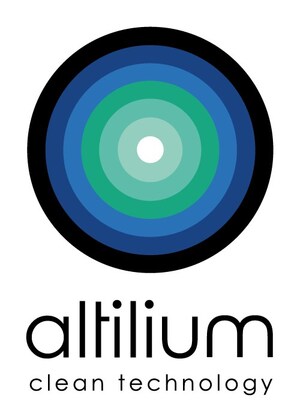PLYMOUTH, England, May 10, 2024 /PRNewswire/ -- Altilium, a UK-based clean technology group focused on supporting the transition to net zero, has today announced details of the latest advances in its innovative EcoCathode™ hydrometallurgical recycling technology, with breakthroughs in the recovery of lithium from new battery chemistries and the production of advanced cathode active materials (CAM).
Altilium is the only company in the UK recycling and upcycling old EV batteries to high nickel p-CAM and CAM for direct reuse in the manufacturing of new EV batteries. Combining green chemistry with advanced materials science, the company is building a domestic, sustainable source of battery raw materials, reducing reliance on imported materials from China and helping to decarbonise the UK transport sector.
Leveraging its proprietary EcoCathode™ process, Altilium has successfully processed LFP batteries, recovering over 97% of the lithium, marking an important step towards sustainable battery recycling. Recovering lithium at high efficiency is a significant breakthrough, as it improves the economics of recycling LFP batteries, which are expected to make up over 40% of the global market by 2030.
Altilium has also delivered the latest generation of its recycled CAM, recovered from old NMC111 battery chemistries and production scrap, for testing at Imperial College London. This marks the first time that Altilium has produced an advanced NMC 622 high nickel chemistry from a mixed stream of lithium scrap.
Using the EcoCathode™ process, Altilium's latest generation CAM has the potential to extend the lifespan of these batteries, while also reducing the carbon emissions by 60% and costs by 20% compared to virgin raw materials, contributing to the creation of more efficient and environmentally friendly EVs.
The material has been sent to Imperial College London for electrochemical performance testing and chemical analysis as part of a collaborative R&D project with a leading automotive OEM. The research on LFP batteries is also being carried out in partnership with Imperial and supported by the Faraday Battery Challenge.
Altilium has now demonstrated its ability to recycle both LFP and NMC batteries, which will be critical to developing an economically viable circular economy for battery materials in the UK. As lower cost LFP batteries become more widespread, battery recycling businesses will need to find ways to process these new battery chemistries, which have traditionally been less attractive to recyclers.
Altilium's first mega-scale recycling facility, located in Teesside, will process battery waste from 150,000 EVs a year and has been designed to handle a mixed feed of battery chemistries, including LFP.
Altlium COO Dr Christian Marston commented: "At Altilium we are committed to developing innovative new technologies as we look to build a domestic supply chain for the lowest carbon battery materials. By optimising our technology we are resolving some of the economic challenges around recycling LFP batteries and delivering high quality CAM for qualification with automotive partners."
NMC batteries, which contain lithium, nickel, manganese and cobalt, are currently the dominant chemistry in the UK. However, LFP batteries, which use lithium iron phosphate as the cathode material, are becoming increasingly popular with automotive OEMs and battery manufacturers, as they look to reduce their reliance on scarce materials, such as nickel and cobalt.
The shift to LFP batteries presents a challenge for battery recyclers, as the iron and phosphate are less valuable than nickel and cobalt, which makes the economics more challenging. As a result, LFP batteries are currently less likely to be recycled. One way to address this is by recycling more of the lithium, which is a high-value material and can be reused in the production of new CAM.
High-efficiency recovery of lithium also aligns with new EU Battery regulations, which set a target for minimum recycled efficiency of 80%.
Altilium is also able to recycle the graphite, for reuse in the production of new anodes, which further improves the economics. While the iron and phosphate are less valuable, they can still be recovered for reuse in other industries.
By recycling to CAM, Altlium will offer a closed loop solution to OEMs and cell manufacturers, with EV battery collection from the final holder, processing of waste batteries and chemical refining to battery-ready materials.
According to the Advanced Propulsion Centre, UK battery demand is forecast to reach 91 GWh per year by 2030, to support the production of 1.2 million EVs a year. In order to meet this demand, the UK will require 163KT of CAM per year.
Altilium's Teesside recycling plant will produce 30,000 tonnes of CAM a year – enough to meet nearly 20% of forecast demand in the UK by 2030.
About Altilium
Altilium is a UK-based clean tech group that will reshape the UK and European automotive supply chain by offering high volume, low carbon domestic sources of cathode and anode materials from recycling waste streams already in circulation, such as lithium scrap.
The company's proprietary "EcoCathode" process converts end-of-life EV batteries and manufacturing scrap into domestic, sustainable, battery precursors, cathode active materials (CAM) and cathode precursor (pCAM) for direct reuse in new batteries.
Altilium's first mini-commercial plant is currently under construction in Plymouth while its planned Teesside plant will be one of the largest EV battery recycling facilities in Europe. The plant will have the capacity to process scrap from over 150,000 EVs per year, producing 30,000 MT of CAM, enough to meet around 20% of the UK's expected needs by 2030.
The company is backed by SQM Lithium Ventures, the corporate venture arm of the lithium business of Sociedad Quimica y Minera de Chile (SQM).
For more information go to www.altilium.tech
Logo - https://mma.prnewswire.com/media/2343299/4618659/Altilium_logo.jpg







Share this article